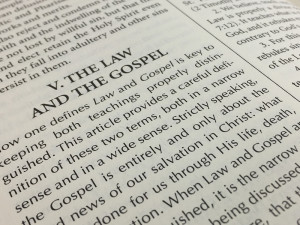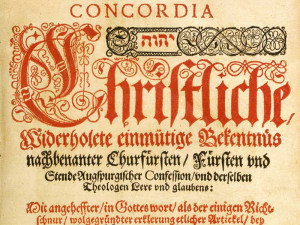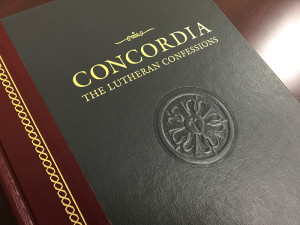by Rev. Mark Bestul
 Even during Luther’s lifetime, a strong “antinomian” (against the Law) spirit had risen up among certain theologians who claimed that, once the Gospel regenerates the heart, the Law is no longer needed. Luther defended against such dangerous notions (championed by John Agricola), saying, “The Law must be retained, that the saints may know what kind of works God requires in which they may exercise their obedience toward God.”[1] Despite Luther’s condemnation of antinomianism, the false teachings persisted so that the confessors of the Formula of Concord needed to address the situation. What is the proper role between Law and Gospel? How does the theologian rightly handle the Word of Truth so that the Gospel’s light is not dimmed and the Law’s holiness is not diminished?
Even during Luther’s lifetime, a strong “antinomian” (against the Law) spirit had risen up among certain theologians who claimed that, once the Gospel regenerates the heart, the Law is no longer needed. Luther defended against such dangerous notions (championed by John Agricola), saying, “The Law must be retained, that the saints may know what kind of works God requires in which they may exercise their obedience toward God.”[1] Despite Luther’s condemnation of antinomianism, the false teachings persisted so that the confessors of the Formula of Concord needed to address the situation. What is the proper role between Law and Gospel? How does the theologian rightly handle the Word of Truth so that the Gospel’s light is not dimmed and the Law’s holiness is not diminished?
On the heels of Article V (Law and Gospel) comes the Formula of Concord’s article on the third use of the Law. Its placement, almost as if an addendum to Article V, perhaps reminds us that, just as the purity of the Gospel must be safeguarded from commingling with the Law, so must the Law be safeguarded from being considered “abolished” by the Gospel.
How important, even for those who rejoice in the free gospel of Jesus Christ, that we cherish the Law of God, by which He teaches us His will and ways! Let us meditate upon this sixth article of the Formula of Concord (using Concordia: The Lutheran Confessions, second ed.), that we might learn to love the third use of the Law:
For ease of studying, bookmark Epitome (Ep) VI, p. 486f, and Solid Declaration (SD) VI, p. 557f, as we will reference both frequently.
1. Read SD 4 and notice the phrase, “justified Christians are liberated and made free from the curse of the Law. Yet they should daily exercise themselves in the Law of the Lord.” What is the difference between being “freed from the curse of the Law” and “freed from the Law”? How has not properly understanding this led some Christians (and even entire church bodies!) to the dangers of antinomianism (“By dying for sins, Jesus freed us to live however we want”) and the acceptance (even institutionalization) of sin?
 2. Read SD 6. Consider the thought that begins and ends, “If God’s believing and elect children were completely renewed in this life by the indwelling Spirit, … they would act just like the holy angels, who offer an entirely voluntary obedience.” How does the third use of the Law serve as a salutary reminder (even if as a slice of ‘humble pie’) that we Christians are not free from the effects of sin? How will this inform our understanding of what we hear in sermons? Consider these words from the Epitome (3), “… the preaching of the Law is to be encouraged diligently… also for true believers, who are truly converted, regenerate, and justified through faith.”
2. Read SD 6. Consider the thought that begins and ends, “If God’s believing and elect children were completely renewed in this life by the indwelling Spirit, … they would act just like the holy angels, who offer an entirely voluntary obedience.” How does the third use of the Law serve as a salutary reminder (even if as a slice of ‘humble pie’) that we Christians are not free from the effects of sin? How will this inform our understanding of what we hear in sermons? Consider these words from the Epitome (3), “… the preaching of the Law is to be encouraged diligently… also for true believers, who are truly converted, regenerate, and justified through faith.”
3. “Believers are not renewed in this life perfectly or completely… the old Adam still clings to them” (SD 7). When we think on fellow Christians in the pews next to us, is our first thought, “These Christians should know better!” or does the third use of the Law remind us, “These fellow sinners need my patience and encouragement as we all continue to wrestle with sin”? Again, have you ever heard a sermon that focused perhaps a bit too much on the ability to improve one’s life? By all means, the Law admonishes the Christian to delight in God’s will, and the believer seeks to do so because he knows he is freed by the Gospel of Christ from the curse of any such failure; but such does not mean we ought to think we can improve ourselves “perfectly or completely” this side of heaven. “The old Adam still clings” to us. And “Because of these fleshly lusts, God’s truly believing, elect, and regenerate children need the daily instruction and admonition” (SD 9).
4. So, if the third use of the Law teaches us how to live, does it have the power to effect such living? Read SD 11-12. Thanks be to God for the gospel of Christ, which is just as beneficial and central for the regenerate as for the unregenerate! (SD 11-12)
 5. In the same context as the question above, how ought we see the liturgy? Does it “effect life”? And yet, doesn’t it “teach us” to subdue the flesh? Read and consider Ep 4 and SD 20. Certainly, this paragraph speaks of “worship” in ways other than just the worship service. Yet, it still applies: how is the liturgy a form of disciplining the old Adam? How is “self-chosen worship” potentially a danger of antinomianism? We must be careful of this, even we in the freedom of the Gospel, because of our own weaknesses!
5. In the same context as the question above, how ought we see the liturgy? Does it “effect life”? And yet, doesn’t it “teach us” to subdue the flesh? Read and consider Ep 4 and SD 20. Certainly, this paragraph speaks of “worship” in ways other than just the worship service. Yet, it still applies: how is the liturgy a form of disciplining the old Adam? How is “self-chosen worship” potentially a danger of antinomianism? We must be careful of this, even we in the freedom of the Gospel, because of our own weaknesses!
6. How do we understand “works of the Law” versus “fruit of the Spirit”? Read Ep 5-6. Consider what is said of believers, who “act as though they knew of no command, threat, or reward.” Sometimes, we can rightly say, “I don’t do this because I have to” but wrongly say, “I do this because it makes me feel good.” Isn’t that reward?! Rather let us carry out the fruits of the Spirit, not because of how it will benefit me, but my neighbor. Consider how “the Golden Rule” is really a great example of fruit of the Spirit!
7. Read SD 21. How can we strive to teach the third use of the Law? Consider the Small Catechism’s explanation of the Ten Commandments: Not only does Luther say, “We should fear and love God so that we do not” but each explanation includes what we should do. Likewise, do we go back to the Ten Commandments when teaching/learning sanctification, or do we only use the Ten Commandments to say, “I’m a sinner”?
8. Can we rightly say that our good works are “acceptable and well pleasing to God”? Read SD 22 and consider how the Gospel gives us good news regarding our acceptability to God in Christ!
 To close our study on this article, we cherish the words of the psalmist that the regenerate sing in the Order of Vespers, “Teach me Your way, O Lord, that I may walk in Your truth.” (Third use of the Law!) Indeed, the regenerate join with the glad song of the psalmist, “I find my delight in Your commandments, which I love. I will lift up my hands toward Your commandments, which I love, and I will meditate on Your statutes” (Psalm 119:47-48).
To close our study on this article, we cherish the words of the psalmist that the regenerate sing in the Order of Vespers, “Teach me Your way, O Lord, that I may walk in Your truth.” (Third use of the Law!) Indeed, the regenerate join with the glad song of the psalmist, “I find my delight in Your commandments, which I love. I will lift up my hands toward Your commandments, which I love, and I will meditate on Your statutes” (Psalm 119:47-48).
The Rev. Mark C. Bestul is pastor of Calvary Lutheran Church in Elgin, IL.
[1] Cited from F. Bente, Historical Introductions to the Book of Concord. Concordia Publishing House, 1965 (reprint), 164-165.
